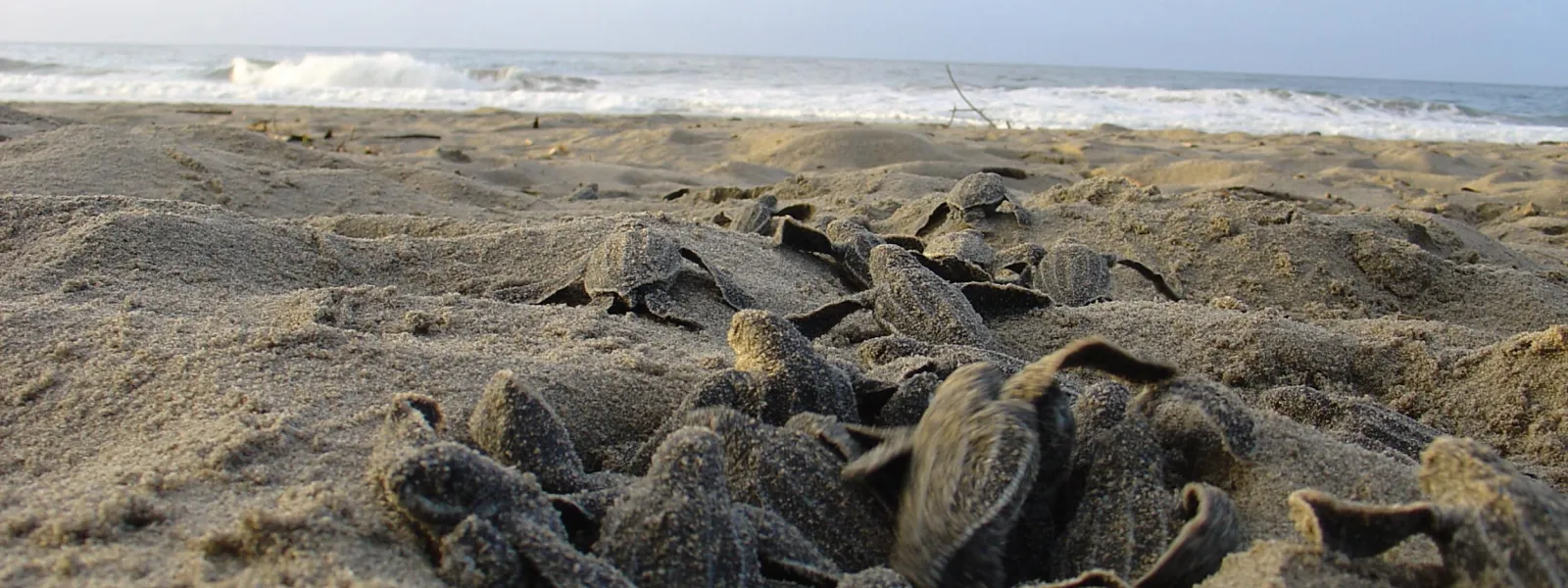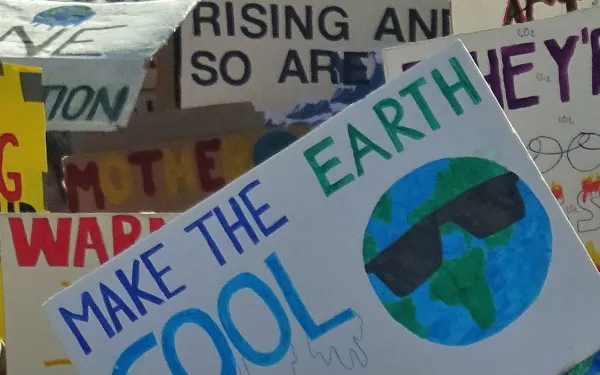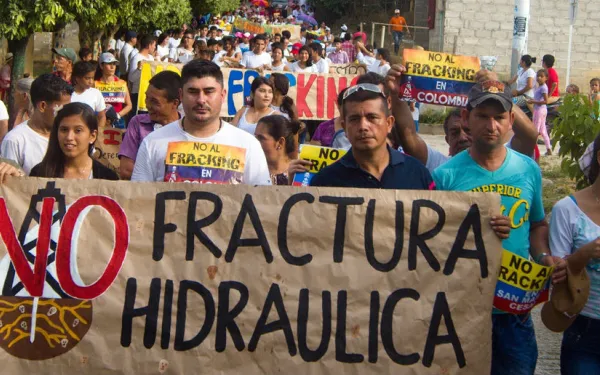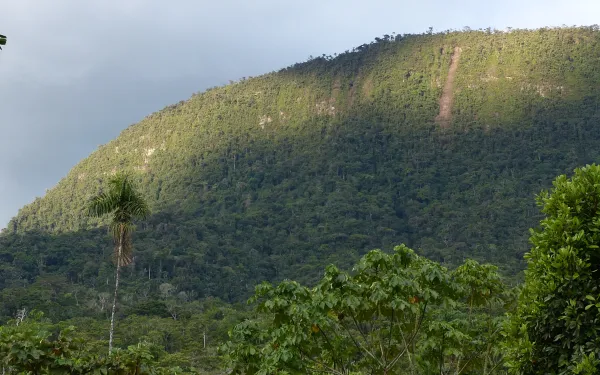
Project
Victory: Haven for leatherback sea turtles declared off-limits
In two separate rulings in May 2008, the Costa Rican government stood up for endangered leatherback sea turtles against business interests intent on building within their protected habitat.
A relative of dinosaurs, the endangered leatherback sea turtle has continually found its home in Costa Rica under threat. Poor planning and lack of oversight destroyed its nesting beaches in Flamingo and Tamarindo.
This time developers had their eye on the Leatherback National Marine Park (LNMP), home to some of the most important Leatherback nesting beaches in the Eastern Pacific Ocean.
A municipal zoning regulation was enacted that would authorize construction in part of the LNMP. However, AIDA and its local partner CEDARENA, together with the Leatherback Trust, successfully defended the park.
The Constitutional Chamber of the Costa Rican Supreme Court nullified the municipal zoning regulation, safeguarding the Leatherback sea turtles and their nesting beaches. This ruling closely followed another court victory by AIDA, CEDARENA, and Justice for Nature that required the government to expropriate the private lands within the LNMP, otherwise destined to be tourist playgrounds.
The leatherback sea turtle will continue to face threats from tourism development, fishing, egg poaching, and pollution. However, AIDA and its partners have shown that the law can be used to make a powerful difference.
Related projects

Declaration: Peoples’ Summit on Climate, Rights and Human Survival
We envisage a world where people thrive as part of nature and where human rights – including the rights of Indigenous Peoples – and the environment come before corporate profit, in an era in which people are more connected with each other and with the planet. We want to live in safe, equal, peaceful and just societies. In societies where every individual and all communities enjoy fair, secure and sustainable livelihoods; participate in decision-making on matters that affect their lives; and have access to information and justice. In a world where the commons are protected and sustainably managed by communities, and where governments and corporations act responsibly and are accountable for the consequences of their actions. We see the opportunity and urgent need to transform our economic, social, legal and political systems to ensure equity and the protection of human rights, to halt the climate crisis and mass extinctions, to protect our children’s future, to hold polluters accountable for their actions, and to make fossil fuels and all unsustainable business practices a relic of the past. We believe that this vision requires protecting, supporting and being in solidarity with those who are suffering from the violence of the climate crisis and those fighting for climate justice.The climate crisis can and must be addressed. An array of effective policy and technical solutions are already known, available and immediately deployable. Governments and corporations bear the primary responsibility for taking the actions that could address and reverse the drivers of climate change and build resilient, adaptable and sustainable communities. We will invigorate our existing efforts around mobilizing the most powerful, united and diverse Peoples’ movement ever assembled. Real and transformative climate action will not be possible without a fully-engaged civil society and population.To achieve climate justice, we, the undersigned, agree to the following:We will increase our efforts to place human rights at the core of climate activism. We will do so by following the lead of Indigenous Peoples, youth, women, people living in poverty, persons with disabilities, fisherfolk, peasants, pastoralcists, local communities, workers, and other disproportionately-affected groups, who are leading the call for climate justice and against activities that destroy the planet. We will demand immediate, bold, people-powered and human rights-consistent action of unprecedented scale to reduce greenhouse gas emissions, in order to protect people, ecosystems, and biodiversity from the climate breakdown. Such actions require transformative change of our economic, social and political systems, to address inequalities in all aspects of life. This transformative change includes the equitable distribution of resources, particularly reducing the unnecessary consumption of resources by privileged groups. It is essential that we achieve drastic and rapid reductions in emissions globally and a fossil-free future, to keep the temperature rise as low as possible and no higher than 1.5°C degrees, as current levels of warming are already resulting in human rights violations. We will demand that all government climate policies, measures, and actions respect, protect and fulfil human rights – including the right of people to be fully informed and empowered to participate in a meaningful way in climate decision- making – and that corporations fulfil their responsibilities to respect human rights across their supply chains. We will oppose any policy or action taken to combat climate change or support adaptation that comes at the cost of human rights, and those that would deepen inequalities and cause impoverishment, hunger, dispossession, and economic, social and political exclusion. We will increase the pressure on those countries and corporations most responsible for climate change and with the most resources available. We demand that all countries urgently establish and enforce science-based emission reduction targets compatible with the protection of human rights, and that they meet these targets on or ahead of schedule. We will oppose attempts to transfer the burden and responsibility for change from high-emitting countries to countries with fewer resources and lower historical emissions, and from corporations and privileged groups to less-privileged groups. We will compel those bearing more responsibility for the crisis to own their actions and take measures accordingly. We will call upon those States with the greatest responsibility for climate damage and with the most resources to provide the necessary financial and technological resources to countries in the global south to facilitate their ambitious actions for climate change mitigation and adaptation. We demand that those States also provide adequate means – including compensation – to affected communities and individuals to address the loss and damage caused by the climate crisis, in full consultation with them and respecting their individual and collective customs and rights. We will promote transparency and adequate use of those resources and will oppose the creation of additional financial burdens and debts as a result of this support. We will relentlessly challenge corporate capture of policies and institutions, and we will hold accountable climate destructive industries and their financial backers. We will demand a just, fair and inclusive transition away from fossil fuels and towards sustainable agriculture and renewable energy that empower Indigenous Peoples, workers, peasant farmers, pastoralists, fisherfolk, and communities, rather than disenfranchise them. We will seek measures to ensure that all people, particularly those facing discrimination, have access to climate education and to the resources, training, knowledge, and decent jobs required for a people-powered transition to a decarbonized and resilient society. We will work for the protection, respect, and fulfilment of the rights of Indigenous Peoples, including to their ancestral lands and territories. We will seek the protection, recognition, and promotion of local and traditional knowledge that has proven effective and appropriate in addressing the climate crisis as well as enabling the transition and resilience so urgently needed in our food systems, always with the consent of, and for the benefit of, Indigenous Peoples. We will demand effective and adequate access to justice for individuals and communities whose rights are impacted by the climate crisis or lack of climate action – including those facing climate-induced loss and damage and those whose rights are threatened due to climate-related displacement. We will work to ensure that they are able to enjoy access to justice and effective remedies and that those responsible for climate harms are held to account. We will proactively use national, regional and international human rights bodies and legal instruments to ensure that human rights and obligations are effectively upheld to promote climate justice. We will support all environmental human rights defenders, in particular those who individually and collectively protect their territory, access to land, livelihoods, and the environment, and those campaigning to defend the people and the planet from destructive activities and climate breakdown. We will demand a safe and enabling environment in which all human rights defenders, particularly those facing multiple and intersecting forms of discrimination and inequality, are effectively protected and able to defend and promote human rights without fear of punishment, reprisal, or intimidation. Read the full declarationRead the declaration in SpanishRead the declaration in Portuguese
Read more
State Council maintains suspension of fracking in Colombia
We are proud to be part of the litigation in which this decision occured and hope that the high court will continue to prioritize the precautionary principle and consider the risks of harm that fracking poses to the environment and human health. Bogotá, Colombia. In response to an action filed by the Public Interest Legal Clinic of the Universidad del Norte, Colombia's State Council maintained the provisional suspension of the exploration and exploitation of non-conventional hydrocarbon deposits through hydraulic fracturing. This means that fracking continues to be suspended in Colombia, that it is currently illegal to carry it out, and that Colombia is in the midst of a moratorium on fracking by court order. With its decision, the State Council, a Colombian High Court, rejected the government's request, which sought to lift the suspension that has been in force since last November and give free rein to fracking in the country. AIDA celebrates the State Council's decision and we feel very honored to be part of this litigation. It is undoubtedly a step in the right direction given the high degree of uncertainty about the risks associated with fracking. These include: air pollution, the contamination of surface and groundwater sources, damages to human health, and emissions of methane—a potent greenhouse gas and one of the main aggravators of the climate crisis facing the world. In this scenario, the urgency of moving towards clean energy is evident. The high court concluded that the precautionary principle should be applied because, even without absolute scientific certainty, there is minimal evidence of potential damage resulting from an apparent deficiency in the measures contemplated in the regulation of fracking. Colombia today aims to be an example for Latin America. The provisional suspension of the regulation corresponds to a precautionary measure while the case is definitively resolved. It is essential that the State Council continue to give priority to the precautionary principle, taking into account the lack of full certainty about the risks of irreversible damage that fracking implies for the environment, the climate and for people. At AIDA, we welcome judicial independence, because it is fundamental for the legal protection of the environment. We hope that the ongoing judicial process will properly consider the evidence and arguments presented, including those related to an increasingly urgent task: the fight against the climate crisis. PRESS CONTACT: Victor Quintanilla (Mexico), AIDA, [email protected], +5215570522107
Read more
Ecuador bets on a mining boom, at the expense of nature
In southeast Ecuador, in the heart of its Amazon, stands an imposing mountain massif that stretches more than 160 kilometers in length: the Condor Mountain Range, which, once largely unknown, retains an expansive intact and unexplored territory. In this area of vital importance for life, science and conservation, an open-pit copper mine known as the Mirador project, with an expected lifespan of 30 years, began operating in July. The launch of the project marks the beginning of large-scale mining in Ecuador, with which the government intends to sustain the economy and leave behind its dependence on oil. This is a sad novelty because large-scale mining involves the risk of enormous environmental damages, which are most serious in ecosystems of great biodiversity and proximity to water sources such as the Condor Range, where indigenous and peasant communities also live. This impulse toward extractive activity contradicts the progress made in 2008, when Ecuador was the first country in the world to recognize the rights of nature in its Constitution. As the Amazon burns in flames, and takes our future with it, Ecuador has a responsibility to change course. The nation must serve as an example for other countries of the Amazon Basin, and the world, of the effective protection of the rainforest and those who depend on it. The resources we must conserve "This country lacks resources." Based on these words, the Mirador project and the presence of the mining industry in Ecuador has been intensified without precedent. They were said by spokespersons of the Chinese company Ecuacorriente (in charge of the mining concession) and echoed, in turn, by government representatives. But what will happen to the biodiversity and environmental services of the priceless Condor Range? These Amazonian mountains protect cloud forests and páramos (high mountain wetlands), both natural carbon sinks. They are home to more than 2,000 species of flora, including one of the few carnivorous plants in Ecuador, and hosts 613 species of birds. According to studies, there are another 2,000 plant species to be discovered in this unique environment. It is there that excavations of 300 to 500 meters deep will be carried out to access subsoil minerals, and where risky dams will be built to deposit tons of waste. The damages are already occurring. The company confirmed that 1,422 hectares of forest have been cleared for the project. And local organizations have denounced serious legal and constitutional violations surrounding the project. The discourse of large profits in store for the country from the exploitation and sale of subsoil resources has gained strength in recent months. Official data shows that currently 7.5% of the territory is concessioned for mineral exploration, and the government is analyzing the granting of new concessions. By 2020, the government plans to have a map of the new areas where mining will be permitted. These plans ignore the perpetual impacts of large-scale mining, including impacts on the landscape and damage to water quality. In the case of Mirador, the project has already caused the diversion of the Tundayme River, just to name one of its impacts, recognized as irreversible by the company itself. "Be coherent, stop using cell phones and bicycles and other objects made from materials extracted from the mines," challenged Vice President Otto Sonnenholzner, one of mining's biggest promoters, to those who oppose the projects. "I propose another challenge: you stop using water and food," replied Yaku Perez, a defender of water and prefect of the province of Azuay. The above is the clearest metaphor of what is at stake with the blind advance of open-pit mining in Ecuador. The climate crisis demands a new vision of development The accelerated move towards large-scale mining in Ecuador means acting negligently in the face of the global climate crisis, which forces us to change our development model this decade in order to achieve the goals of mitigation and adaptation. The international scientific community warned in 2018 that we only have a dozen years to maintain global warming at a maximum of 1.5°C (with respect to the pre-industrial era) and that exceeding that limit would make the risks of droughts, floods and extreme heat worse. This requires unprecedented transitions in sectors such as energy and industrial systems. Boosting large-scale mining is reversing and deepening the development model that has caused the climate emergency. It means destroying natural carbon sinks such as those in the Condor Mountain Range and the Amazon as a whole. Ecuador can and must take a new step forward. It must, as it did in 2008 with the recognition of the rights of nature, find a development model that effectively respects its obligations to the climate and to human rights. Ecuador cannot continue to mortgage the present and future of entire communities and ecosystems under the pretext of the immediate and ephemeral profits of mining. New paths are possible and, above all, urgent.
Read more